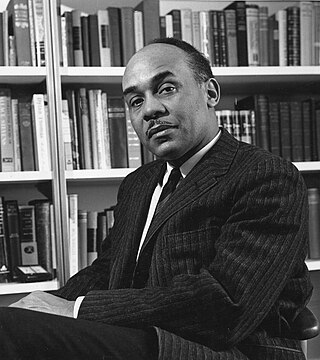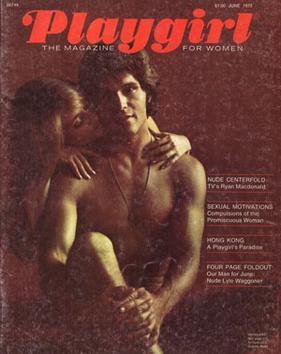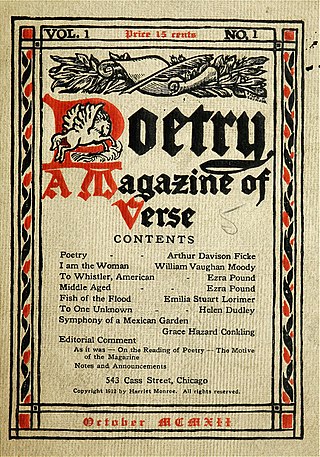
Raymond Thornton Chandler was an American-British novelist and screenwriter. In 1932, at the age of forty-four, Chandler became a detective fiction writer after losing his job as an oil company executive during the Great Depression. His first short story, "Blackmailers Don't Shoot", was published in 1933 in Black Mask, a popular pulp magazine. His first novel, The Big Sleep, was published in 1939. In addition to his short stories, Chandler published seven novels during his lifetime. All but Playback have been made into motion pictures, some more than once. In the year before his death, he was elected president of the Mystery Writers of America.

Ralph Ellison was an American writer, literary critic, and scholar best known for his novel Invisible Man, which won the National Book Award in 1953.

Norman Richard Spinrad is an American science fiction author, essayist, and critic. His fiction has won the Prix Apollo and been nominated for numerous awards, including the Hugo Award and multiple Nebula Awards.

The Bulletin was an Australian weekly magazine based in Sydney and first published in 1880. It featured politics, business, poetry, fiction and humour, alongside cartoons and other illustrations.

Playgirl is an American magazine that has historically featured pictorials of nude and semi-nude men alongside general interest, lifestyle, and celebrity journalism, as well as original fiction. For most of its history, the magazine printed monthly and was marketed mainly to women, though it quickly developed a significant gay male readership.

The Magazine of Fantasy & Science Fiction is a U.S. fantasy and science fiction magazine, first published in 1949 by Mystery House, a subsidiary of Lawrence Spivak's Mercury Press. Editors Anthony Boucher and J. Francis McComas had approached Spivak in the mid-1940s about creating a fantasy companion to Spivak's existing mystery title, Ellery Queen's Mystery Magazine. The first issue was titled The Magazine of Fantasy, but the decision was quickly made to include science fiction as well as fantasy, and the title was changed correspondingly with the second issue. F&SF was quite different in presentation from the existing science fiction magazines of the day, most of which were in pulp format: it had no interior illustrations, no letter column, and text in a single-column format, which in the opinion of science fiction historian Mike Ashley "set F&SF apart, giving it the air and authority of a superior magazine".

Greil Marcus is an American author, music journalist and cultural critic. He is notable for producing scholarly and literary essays that place rock music in a broader framework of culture and politics.

A literary magazine is a periodical devoted to literature in a broad sense. Literary magazines usually publish short stories, poetry, and essays, along with literary criticism, book reviews, biographical profiles of authors, interviews and letters. Literary magazines are often called literary journals, or little magazines, terms intended to contrast them with larger, commercial magazines.

The Believer is an American bimonthly magazine of interviews, essays, and reviews, founded by the writers Heidi Julavits, Vendela Vida, and Ed Park in 2003. The magazine is a five-time finalist for the National Magazine Award.

n+1 is a New York–based American literary magazine that publishes social criticism, political commentary, essays, art, poetry, book reviews, and short fiction. It is published in print three times annualy with regular articles being published online. Each print issue averages around 200 pages in length.

Sandesh is a Bengali children's magazine. It was first published by Upendrakishore Ray in 1913 through his publishing company, M/s U. Ray and Sons. The original partners of the venture were Upendrakishore and his sons Sukumar and Subinoy. Its publication had to be stopped twice. The current phase is the third and longest running one, spanning more than 59 years.

The Threepenny Review is an American literary magazine founded in 1980. It is published in Berkeley, California, by founding editor Wendy Lesser. Maintaining a quarterly schedule, it offers fiction, memoirs, poetry, essays and criticism to a readership of 10,000. Without the support of patrons or a university, the publication has an annual budget of $200,000.

Bookforum is an American book review magazine devoted to books and the discussion of literature. After announcing that it would cease publication in December 2022, it reported its relaunch under the direction of The Nation magazine six months later.

The Stinging Fly is a literary magazine published in Ireland, featuring short stories, essays, and poetry. It publishes two issues each year. In 2005, The Stinging Fly moved into book publishing with the establishment of The Stinging Fly Press. The magazine has been described as "something of a revelation in Irish literature" by The New York Times.
The Australian Horror Writers Association (AHWA) is a non-profit organisation that commenced in 2003 with the goal of providing a unified voice and sense of community for Australian writers of dark fiction (horror and dark fantasy) and to further the development of dark fiction in Australia.
Mark Abley is a Canadian poet, journalist, editor and nonfiction writer. Both his poetry and several nonfiction books express his interest in endangered languages. He has also published numerous magazine articles. In November 2022 Abley was awarded an honorary D.Litt. by the University of Saskatchewan for his writing career and for his services to Canadian literature.
Southerly is an Australian literary magazine, established in the 1930s. It is published in hardcopy and online three times a year, and carries fiction and poetry by established and new authors as well as reviews and critical essays. The Long Paddock is an online supplement, carrying additional material.
Post Road is an American literary magazine established in 1999 that publishes fiction, nonfiction, criticism, poetry, art, and theatre. In addition to these traditional genres, the magazine also features a "Recommendations" section in which established writers suggest their favorite work and an "Etcetera" section which presents literary curiosities such as letters, reprints, and interviews. Post Road is published biannually by the Department of English at Boston College.

The Australian Journal was one of Australia's most successful and influential magazines, running for ninety-seven years from 1865 to its final issue printed in 1962. The magazine began as 'A Weekly Record of Amusing and Instructive Literature, Science and the Arts', but gradually became a more focussed publication of popular short stories written by Australian writers for readers across both genders and age groups.
American Review was a literary journal published from 1967 to 1977 under editor Ted Solotaroff. Though it only published for ten years, it was the longest running paperback literary periodical at the time, and was influential for the large amount of work it published from notable authors.















